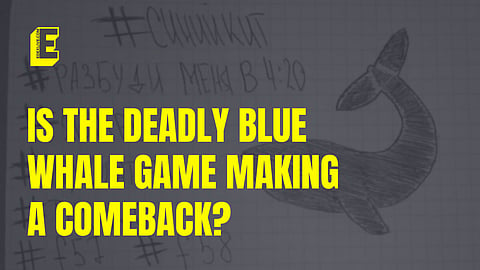

The death of a 20-year-old Indian student at the prestigious University of Massachusetts in the United States (US), which was purportedly tied to the dangerous Blue Whale Challenge, has renewed concerns about the suicide game.
According to accounts, a first-year Indian student in the United States took part in the lethal challenge and held his breath for two minutes, IANS reports.
He was discovered dead on March 8.
The so-called "suicide game" originated in Russia and has claimed the lives of over 130 boys and girls in the United States, China, Ukraine, and India.
What is the Blue Whale Challenge?
The objective of the game, which was developed in 2013 by former Russian convict Philipp Budeikin, is to psychologically push participants to engage in risky, self-destructive tasks for 50 days before ultimately, "winning" by killing themselves. Every task must be filmed and shared as "proof".
The online game featured dares including watching horror and psychic films and cutting their hands with needles and blades, among other things.
Most of the time, young victims are drawn in by curiosity and given simple tasks that lead to addiction. Subsequently, they discover that they are being mentally coerced into completing the tasks, which comprise fifty steps that get harder and harder.
In a media interview, Budeikin claimed that he intended to purge society by inciting suicide among those who believe they are unworthy of living.
The way the game operated was by using a Skype meet to choose gullible "players" from social media who would then be assigned 50 chores over 50 days by "the curator".
Because they were "blackmailed and cyberbullied", players were unable to withdraw.
Budeikin was detained on suspicion of encouraging the suicide of at least sixteen teenagers. He was given a three-year prison sentence after entering a guilty plea.
Cases in India
In July 2017, 14-year-old Mumbai schoolboy Manpreet Singh Sahani fell to his death from the seventh floor of a building, becoming India's first victim of the fatal challenge. It was followed by several cases, one of which was a Class X student in West Bengal dying by suicide. His body was discovered in the bathroom, his face wrapped in a plastic bag and secured with a cord.
Another youngster, the son of a former minister, jumped to his death in Delhi. A teenager in Kerala allegedly died by suicide while attempting to complete the Blue Whale Challenge.
A Class VII boy in Indore, who had documented all 50 stages in his school notebook, was pulled away at the last minute before he could take the final leap.
How did the government respond?
In a 2017 advisory, the Ministry of Electronics and Information Technology described the Blue Whale game as "an abetment to suicide".
With several deaths in India as a result of the game, the government advised parents and guardians to check if their children are isolated from family and friends, are consistently depressed and unhappy, or have any visible marks such as deep cuts or wounds on any part of the child's body.
The government additionally directed internet services such as Google (NASDAQ:GOOGL), Meta's Facebook (NASDAQ:META), WhatsApp, Instagram, and Yahoo to erase links to the game.
